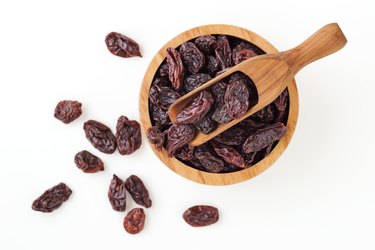
In ancient Rome, raisins were considered a precious commodity used to pay taxes, to reward top athletes and to "cure" old age. Although raisins are far more affordable and obtainable today, you'd still be wise to enjoy them as the Romans did — in moderation.
Tip
Dried grapes have loads of important nutrients. But as with most foods, there are disadvantages of eating raisins if you eat too many in one sitting.
Video of the Day
Raisins: Serving Size Is Key
It takes slightly more than 4 pounds of fresh grapes to produce a pound of raisins, according to the University of California-Davis's Viticulture & Enology program. The fresh fruit loses about 80 percent of its water during the drying process, which is why raisins are significantly smaller and far more nutrient-dense than grapes.
Video of the Day
You'll get just over 100 calories from 1 cup of grapes, which is the standard size for a single serving of most fresh fruit. Given that grapes are roughly four times larger than raisins, it makes sense that 1/4 cup of raisins, which also supplies just over 100 calories, is the healthiest option for raisins serving size. If you eat significantly more than this recommended serving, you may learn the disadvantages of eating raisins, or at least too many of them, the hard way.
Packed With Fiber
A loosely packed quarter-cup serving size of seedless raisins — or right around 70 raisins, according to the U.S. Department of Agriculture — has about 108 calories, 1 gram of protein, 29 grams of carbohydrates and very little fat. It also provides 1.4 grams of fiber, or 6 percent of the recommended daily value.
Because raisins contain equal amounts of soluble and insoluble fiber, they promote normal cholesterol levels as well as bowel regularity. A single serving of raisins also supplies 8 percent and 4 percent of the daily values for potassium and iron, respectively. Potassium helps counteract the effects of sodium, iron keeps your cells oxygenated and both minerals are needed for normal muscle contraction.
Read more: Are Raisins Bad for a Weight Loss Diet?
"Two Scoops" Is Too Much
Raisins are the perfect example of why dried fruit is sometimes called "nature's candy" – nearly 80 percent of their calories come from simple sugars, notes the USDA. Although this does make them a good source of quick energy, it also means they're tasty enough to be tempting to gobble by the handful. Remember — that "two scoops" cereal commercial referred to the perfect amount for the whole box, not one serving!
It's not hard to eat two or more servings of raisins in one sitting, especially if you don't know what a 1/4-cup serving actually looks like. While you'd get close to 3 grams of fiber and 16 percent of the daily value for potassium from 1/2 cup of loosely packed raisins, you'd also be getting about 215 calories and almost 60 grams of carbohydrates, most of which are simple sugars.
Avoid That Sugar High
Eating too many raisins affects your blood sugar levels in two ways. Although fiber slows the process somewhat, simple carbohydrates generally raise your blood sugar more quickly than complex carbohydrates, the kind found in vegetables and whole grains. It's the total amount of carbohydrates you consume that determines how high your blood sugar levels go, however, which is why a large serving of raisins has a far greater effect on your blood sugar than a small one.
Read more: Can Diabetics Eat Dried Fruit?
The Centers for Disease Control and Prevention recommends that people with diabetes avoid high blood sugar levels by consuming no more than 15 grams of carbohydrates per meal. If you have diabetes or insulin resistance, therefore, a serving of raisins is about half the standard amount, or just 2 tablespoons.
- California Raisins: "History"
- USDA National Nutrient Database: "Raisins, Seedless"
- USDA National Nutrient Database: "Grapes, Red or Green, (European Type, Such as Thompson Seedless), Raw"
- University of Arkansas: Division of Agriculture: Cooperative Extension Service: "The Exchange List System for Diabetic Meal Planning"
- Centers for Disease Control and Prevention: "Diabetes and Carbohydrates"
- UC Davis Viticulture & Enology:"Harvesting and Handling"
- Harvard Health Publishing: "Important Minerals for Health"